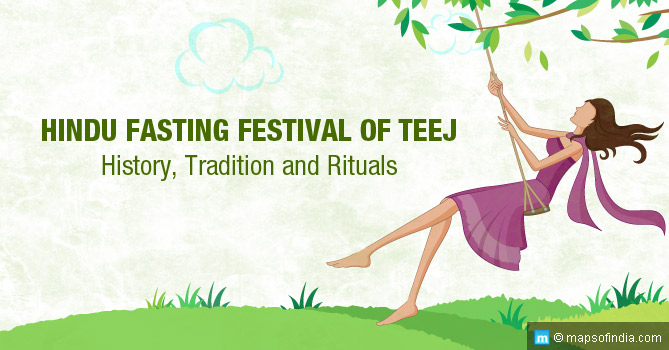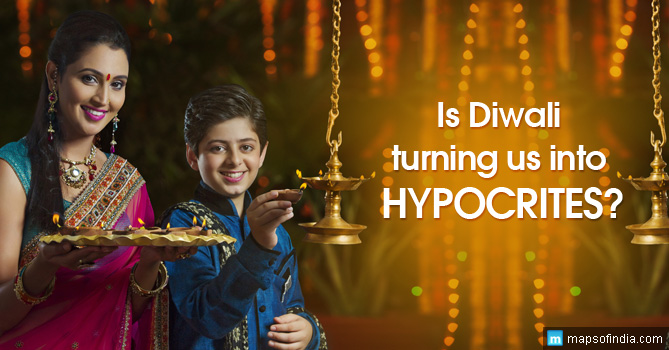
Hariyali Teej, the Swing Festival, is celebrated by the married women of North India, from the States of Bihar, Rajasthan, Uttar Pradesh, Madhya Pradesh and Haryana, during the month of Shravan. As per the Hindu Lunar Calendar, Shravan is the monsoon period of India which falls in the months of July and August. It is believed that when married women keep a ‘Nirjara‘ (fasting without water) fast during the festival of Hariyali Teej, their respective husbands are endowed with a long and healthy life. Even unmarried women of North India keep this fast with the belief that Teej Mata (Goddess Shakti in the form of Devi Parvathi) will bless them with a good husband in future and they will enjoy marital bliss.
The Legend
As per mythology the story unfolds in the following manner:
- Goddess Shakti in the form of Devi Sati was the wife of Lord Shiva.
- However, Devi Sati’s father was disrespectful towards Lord Shiva which resulted in her giving up her life by setting herself ablaze with a vow that she would take rebirth as the daughter of a father who would respect her better half.
- Thus, Devi Parvathi also known as Teej Mata was born to Lord Himavat, who respected Lord Shiva.
- However, Lord Shiva had gone into penance after the death of Devi Sati and refused to acknowledge the presence of Devi Parvathi.
- Goddess Parvathi did not lose heart, and decided to undergo a self imposed penance till Lord Shiva realised her devotion and accepted her as his wife.
- Lord Shiva at last accepted Goddess Parvathi as his wife and their union took place on the third day of Shukla Paksha in Shravan month.
- Shravan is also known as Madhurshravani to symbolise the union of Lord Shiva and Devi Parvathi after a long separation.
- Goddess Parvathi on this day promised that any woman who fasts and prays for her husband would gain Her blessings and the husband would be blessed with a long and a healthy life.
- Thus on Hariyali Teej, married women seek the blessings of Goddess Parvathi for conjugal bliss and the long life of their husbands, while unmarried women seek Her blessings for a husband like Lord Shiva.
Significance of Shravan Month
Shravan month marks the beginning of monsoon in India. As we know, monsoon is symbolic of new life and greenery all around, as the parched earth after the gruelling months of summer gets revived. The word Hariyali in the festival means greenery. Thus, Hariyali Teej celebrated in the month of Shravan symbolises prosperity, happiness and growth in the marital life of couples. In a way, Hariyali Teej is the celebration of nature itself, when women pray for a good harvest too.
Celebrations Galore
Womenfolk fast without water on this day. They dress up like a bride in beautiful green attire, wear jewellery, and apply henna on their palms. The colour green is the order of the day and women sport bright green bangles on their wrists. As per tradition, Sindhara, a bucket full of gifts like clothes, jewellery, beauty products and sweets, is given to the married women by the in-laws. Newly married women celebrating their first Hariyali Teej go and spend the day at their parent’s house.
Another unique practice of this festival is that women sit on swings and imitate their deities. Swings are an intricate part of this festival. This festival is a time for some fun and frolic and thus to add to the jollity, swings are hung from the trees. Also, swinging during monsoon season is considered to be fun. Large fairs are organised where women get together, sing songs in the praise of Goddess Teej Mata, and swing to their heart’s content.
Hariyali Teej is celebrated with great zeal, pomp and grandeur in the following states:
- In Gujarat, womenfolk in traditional attire carry pots on their heads and sing songs in the praise of Teej Mata.
- In Maharashtra, women sporting the colour green in clothes and jewellery, also wear golden bindis and apply kohl for luck. They gift beautifully painted coconuts to family and friends. Goddess Parvathi is offered green vegetables and fresh fruits.
- People of Vrindavan celebrate Hariyali Teej with great fanfare. Swings are placed in all the shrines, and the festival is thus also known as Jhulla Leela, where deities are made to swing. This day is the auspicious day chosen for the idols of Lord Krishna and Radha to be taken out of the temple and made to swing in a gold-ornamented swing even as a procession is taken out.
In 2019, Hariyali Teej will be celebrated on Saturday, August 3.
The Present Day Connotation
Life in the rural areas, for the middle class families, and for couples living in joint families is indeed mundane, and lacks the thrill and excitement of romance in any form. Unlike their urban counterparts, they neither have the time nor privacy to engage in frivolous acts of romance. There are no occasions like Valentine’s Day in the lives of these couples to re-infuse the feeling of love and affection in the relationship. Festivals like Hariyali Teej, celebrated once a year, act as a catalyst to infuse an essence of romance into the lives of married couples. On this day while the wives dress especially for their husbands, their act of fasting garners special love and affection in the husbands. At the end of the day, whether the fast will increase the lifespan of the husband or not is surely a matter of individual faith and belief; but the festival itself does help instil conjugal bliss in the present day.
Conclusion
Festivals symbolise celebration of life. And any festival that fosters love and well being is always more than welcome. With the changing time, if, men also fast for the longevity of their wives, like Chetan Bhagat had suggested a couple of years back during Karwa Chauth, then the festivals will become all the more beautiful. Let’s celebrate life. Let’s celebrate love. Happy Hariyali Teej.
Read More:
Indian Festivals in the Month of August





